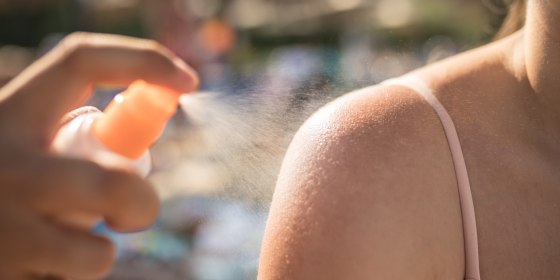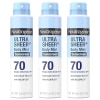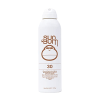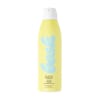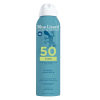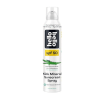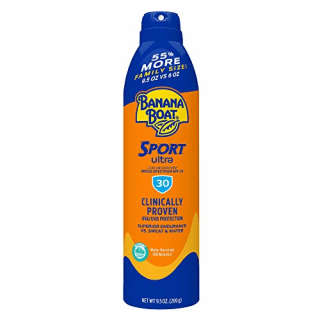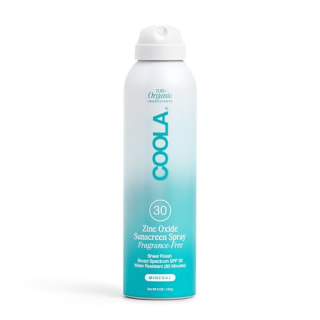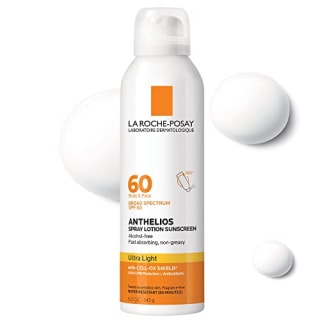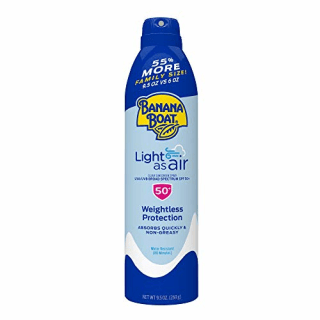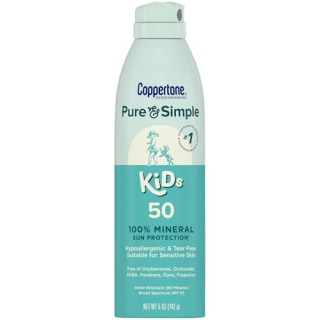Dermatologists often say that the best sunscreen is the one you’ll actually wear — and for many, that’s spray sunscreen. Adults and kids alike often find spraying SPF onto their skin simpler and more convenient than rubbing in a thick, white, creamy lotion. The good news? Spray sunscreen is just as effective as its lotion, cream and gel counterparts, says Dr. Michele Green, a board-certified dermatologist who practices in New York City. But in order to protect yourself from UV rays, you must apply it correctly, which is easier said than done.
I spoke to medical experts about the dos and don’ts of using spray sunscreen, as well as how to shop for it. I also curated a list of the best options to buy, including those recommended by experts and the NBC Select staff.
How I picked the best spray sunscreens
While shopping for spray sunscreen, dermatologists suggest thinking about the following factors, all of which I took into consideration while curating my recommendations.
- SPF rating: All the experts I spoke to recommend wearing sunscreen that has a SPF rating of at least 30. That’s in line with the recommendation from the American Academy of Dermatology and Skin Cancer Foundation.
- Broad-spectrum protection: When you see “broad-spectrum” printed on a bottle, it means the sunscreen protects skin from UVA and UVB rays, says Dr. Jaimie DeRosa, a double board-certified plastic and reconstructive surgeon and the founder of DeRosa Center Plastic Surgery & Med Spa. UVA rays can lead to signs of aging, like a loss of elasticity and fine lines, while UVB rays can damage the skin’s DNA, creating the inflammatory response that leads to sunburns or more severely, skin cancer.
- Type: You’ll need to decide between purchasing a chemical or mineral sunscreen, or a hybrid option that contains chemical and mineral active ingredients. I explain the difference between the three types in the FAQ section below, and why you may choose one over the others. That said, chemical, mineral and hybrid sunscreens all adequately protect your skin, so it’s entirely a personal preference, says Green.
- Water-resistance: If you plan to be in water or may sweat while wearing spray sunscreen, choose a water-resistant option. The sunscreen’s label tells you how long its formula is water-resistant for.
- Reef-safe: There’s no standard or regulation behind the terms “reef-safe” and “reef-friendly,” but they’re used to describe sunscreens that don’t have ingredients found to potentially harm coral reefs and other marine life, including chemicals like oxybenzone and octinoxate. Most reef-safe sunscreens are mineral-based and have micro-sized or non-nanoparticles — nanoparticles can be ingested by coral and negatively impact its health, according to the National Park Service. I labeled which sunscreens I recommend are reef-safe.
The best spray sunscreens for adults and kids
To recommend the best spray sunscreens, I rounded up options editors and experts swear by. All of the options below offer broad-spectrum protection and have a SPF rating of at least 30.
Best overall chemical
Neutrogena’s spray sunscreens are popular among our experts, and Green specifically likes the brand’s unscented Ultra Sheer option. “It seamlessly blends into skin without leaving a white cast and does not feel greasy,” she says. The formula, which is made with vitamin E, is oil-free and non-comedogenic, which means it won’t clog pores and is suitable for those with acne-prone skin.
Best overall mineral
Many NBC Select staff members say this Sun Bum spray sunscreen is their go-to option, and it’s also recommended by DeRosa. The sunscreen’s unscented, zinc-based formula leaves a matte finish on the skin. It’s made from a gluten-free, vegan and cruelty-free formula, meaning it’s not tested on animals.
Best sport
I always have a bottle of Banana Boat’s sport spray sunscreen at home and lather it on before I go on a run. Its lightweight formula dries quickly and it doesn’t leave my skin feeling greasy or sticky. The spray’s “sunscreen” scent is also not overbearing, which I appreciate.
Best matte finish
When you spray Coola’s unscented sunscreen on your skin, it goes on white and dries sheer, leaving behind a matte finish, according to the brand. In addition to zinc oxide, the sunscreen has antioxidants in its formula to help fight free-radical formation that can occur from sun exposure, says DeRosa. It comes in a non-aerosol can.
Best for sensitive skin
La Roche-Posay makes some of our favorite moisturizers, cleaners and sunscreens, including this unscented, oil-free and alcohol-free spray. It has thermal spring water in its formula, which is a soothing antioxidant, and it’s safe for sensitive and acne-prone skin, according to the brand.
Best lightweight
As its name suggests, this spray sunscreen really does feel “light as air.” It absorbs into my skin seconds after I rub it in and never creates a white cast since it’s clear. Plus, because the SPF doesn’t leave behind a greasy residue on my skin, I don’t mind constantly reapplying it. I use Banana Boat’s spray daily during the warmer months when I spend hours walking around Manhattan, so I buy the biggest bottle I can find, which usually lasts me over a month.
Best scent
Some unscented and fragrance-free sunscreens still have that distinct “sunscreen” smell, which I despise. I’m always looking for options that actually smell good without being perfumy, a balance that Bask’s SPF achieves. Its tropical aroma reminds me of a piña colada, leaning more coconut and vanilla than pineapple. I always bring Bask’s sunscreen on vacation, and whenever I apply it, people around me ask about it since it smells so good. The SPF also dries clear, in my experience, and it’s lightweight and fast-absorbing. It comes in a non-aerosol bottle.
Best for kids
Blue Lizard’s fragrance-free mineral spray sunscreen is specifically made for kids. It’s gentle and non-irritating on delicate skin, according to the brand, and it dries clear. In addition to standard kids spray sunscreen, Blue Lizard also makes a sensitive skin and sport formula.
Best for kids with sensitive skin
Coppertone’s fragrance-free Pure & Simple Spray Sunscreen has a gentle, hypoallergenic formula, so it’s best for those with allergies and sensitive skin, says Green. The sunscreen is made with zinc oxide and hydrating plant-derived ingredients like tea leaf extract, sea kelp extract and lotus extract.
Best for babies
NBC senior photo editor Becca Delman started using this sunscreen with her son when he was about 1.5 years old and it’s still one of her favorite spray options. She likes its lightweight feel and says it blends into her son’s skin well, so it doesn’t leave behind an oily or gritty residue. The sunscreen’s vegan formula is also hypoallergenic and moisturizing, plus it doesn’t have any synthetic fragrances.
How to properly apply spray sunscreen
“The efficacy of sunscreens, no matter the formulation, lies in proper application,” says Green. And one of the biggest disadvantages of spray sunscreen is that it’s easy to apply incorrectly. To make sure you’re using spray sunscreen the right way, follow the guide below.
A step-by-step guide to applying spray sunscreen
- Hold the spray bottle’s nozzle about three to four inches away from your skin.
- Spray multiple passes across each part of your body. Two to three times per arm and three to four times per leg is a good rule of thumb, says Dr. Corey L. Hartman, a board-certified dermatologist and the founder of Skin Wellness Dermatology in Birmingham, Alabama.
- Between each spray, rub the sunscreen into skin until it’s entirely blended in. “If you skip this step, the spray will only protect where it actually hits the skin,” deeming it ineffective for full-body protection, says Hartman.
- Spray sunscreen works best as a body sunscreen, but if you want to use it as a face sunscreen, spray it into your hands first and rub it into your skin. Never spray sunscreen directly onto your face as you’ll risk inhaling it and getting it into your eyes.
Mistakes to avoid while applying spray sunscreen
“The biggest mistake that people make with spray sunscreen is that they don’t apply enough and spray too quickly, so they’re missing areas of skin during application,” says DeRosa. The solution? Apply a generous amount. A good rule of thumb is if you can’t see it on your skin after spraying, there’s probably not enough. You can (and should) apply multiple coats of spray sunscreen. “I suggest applying the spray, spreading it on the skin, and coming back 10 minutes later to reapply,” says Dr. Eileen Deignan, board-certified dermatologist and the chief of dermatology at Emerson Hospital.
It’s also important to avoid inhaling spray sunscreen or getting it in the eyes, nose or mouth, which can cause irritation. To make sure spray sunscreen actually reaches your body, hold the nozzle close enough to your skin, apply it slowly and don’t use it in windy conditions, says Green. Also don’t forget about your ears, scalp, feet and hands.
How often should you reapply spray sunscreen?
You need to constantly reapply all types of sunscreen regardless of whether you’re exposed to water. Reapply every two hours if you’re spending time outdoors or sitting next to a window indoors, says Hartman. And if you’re swimming or sweating, reapply sunscreen every 80 minutes and after drying off, even if you’re using a water-resistant formula, says DeRosa.
Meet our experts
At NBC Select, we work with experts who have specialized knowledge and authority based on relevant training and/or experience. We also take steps to ensure that all expert advice and recommendations are made independently and with no undisclosed financial conflicts of interest.
- Dr. Michele Green is a board-certified cosmetic dermatologist based in New York City.
- Dr. Corey L. Hartman is a board-certified dermatologist and the founder of Skin Wellness Dermatology in Birmingham, Alabama.
- Dr. Jaimie DeRosa is a double board-certified plastic and reconstructive surgeon. She’s the founder and lead facial plastic surgeon at DeRosa Center Plastic Surgery & Med Spa in Boston and Palm Beach.
- Dr. Eileen Deignan is a board-certified dermatologist and the chief of dermatology at Emerson Hospital. She practices medical dermatology at the Dermatology Associates of Concord.
Why trust NBC Select?
I’m a reporter at NBC Select who writes about skin care, including topics like tinted sunscreen, ingrown hair, razor burn and sunscreen for acne-prone skin. For this article, I interviewed four experts about how to shop for spray sunscreen and rounded up options recommended by dermatologists and the NBC Select staff.
Catch up on NBC Select’s in-depth coverage of tech and tools, wellness and more, and follow us on Facebook, Instagram, Twitter and TikTok to stay up to date.
